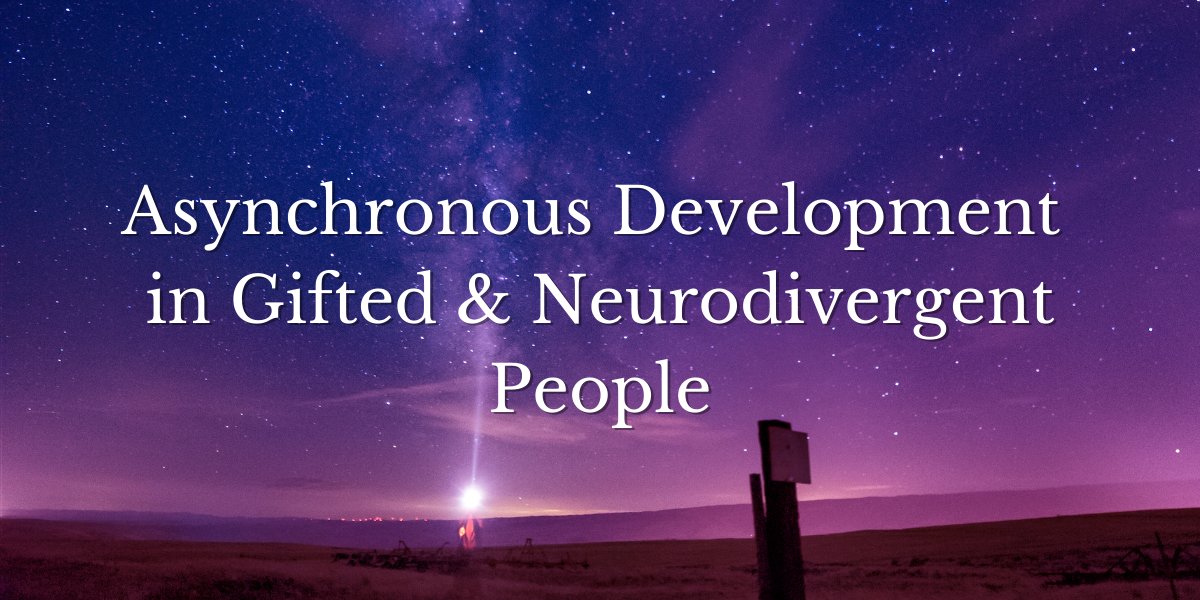This image summarizes a common trait of gifted individuals: asynchronous development. We impart seemingly profound wisdoms and possess heightened skills in particular realms, and then we trip a lot. We bump into the kitchen counter often and forget where we left our keys. Everyday. We don't know how to tie our shoes, or have tantrums because we were interrupted during a preferred activity.
We like My Little Pony and trains obsessively, memorize random facts, and go on binges for information and trivia. Some of us can ace all the quizzes and master language arts and music, but struggle immensely in science or history. We can instill awe of the universe and possibility to our peers one moment, and be unable to read the social cues of when to speak in conversations at others.
We stim, and some of us hand flap. We many times get seen only for our cognitive strengths and denied our wholeness with our vulnerable, intense emotions, learning differences, and physical experiences.
"You're too smart to behave this way." "Why aren't you successful yet?" "Why are you acting like a baby when you just spoke about meta cognition and saving the oceans?"
This is a highly misunderstood part of being gifted because the term “gifted” sounds positive and perfect. Many people pair giftedness with pure genius and ease with learning. Due to this misperception of giftedness and high IQ, we have populations of children and adults who do not get their educational, social emotional, and behavioral needs met. The picture of a gifted person tends to be an ideal student, a high achiever. Because of this myth, many gifted people internalize this identify and push for perfection and mastery, which can lead to additional stress to perform or potentially minimizing one’s intelligence and achievement to negate the burdens of perfection.
According to National Association for Gifted Children (NAGC) asynchronous development may be correlated and more common as IQ increases. This helps explain how many gifted children may have dysgraphia or a difficulty with writing in general. It’s not that they are lazy and don’t want to “try harder” to write, it may be physically painful or difficult to write because of their asynchronous development and poor fine motor skill development.
Highly gifted people do not have the perfect brain and body, but myths have perpetuated these damaging beliefs. We are not all savants who will save the world through tinkering away in a cave or our labs away from social interaction. Some of us will do normal, every day things, and nothing “special” will result. Many of us will be ordinary, and it will be by choice, or a consequence of not having our gifts nurtured.
Some considerations with Asynchronous Development in Gifted Individuals:
Mental age refers to the intellectual capacity of a person at their current age. For instance, a 6-year-old child can have a mental age of 9 based on their intellectual performance, assessments, and scores compared to standardized, scaled scores of peers the same age. Mentally, a young person can appear older and wiser. We tend to pair high intelligence with responsibility and common sense.
It’s important to remember children are children. Their life experiences are not as expansive and rich as an adult’s, even when their intellect may convince others to think otherwise. The myth is highly gifted children do not need guidance or support. They do. The wants to be nurtured, loved, and seen for all parts of who they are is as real as any other child. Sometimes gifted children are only praised for their wit or intellect, which leads to an imbalance or neglect of social emotional aspects of their being.
We (adults, teachers, caregivers) may feel inferior when meeting a profoundly gifted child or adult. Questioning information, authority, or word usage may not be a sign of disrespect or a intentional disruption. rather, it may be a sign of curiosity, and wants to understand in-depth.
Social age may refer to a person’s abilities to engage or process interpersonal exchanges that are typical for their age group. Gifted people tend to be seen as childlike, immature, and at the same time wise beyond their years. A gifted person’s social age may be dramatically lower than their mental or chronological age. This is very common in terms of asynchronous development.
Many younger, gifted children have difficulty relating to their peers because their social age is lower than their mental age. This can lead to profound feelings of loneliness and isolation, and a widened gap in social emotional skills. This inability to relate to peers may guide gifted children to socialize with or prefer relationships with adults or older children.
Chronological age is how old a person is. Highly gifted children tend to prefer interacting with others who are dramatically younger or older than they are. This discrepancy with mental age, chronological age, and social age accumulates to demystify myths on giftedness. The profile of a gifted person varies person to person, and this makes it a unique experience for each individual and family involved.
Overexcitabilities coined by Kazimierz Dabrowski involves heightened ability to respond to stimuli. These areas include: Psychomotor, Sensual, Intellectual, Imaginational, and Emotional. Something educators and caregivers can offer gifted children is the opportunity to soothe/regulate during times of emotional overexcitability, as well as outlets for other realms of excitability. Not all gifted children possess overexcitabilities, but according to SENG it is observed to occur more often in the gifted population. This may overlap with the highly sensitive trait, as researched by Elaine Aron.
The most common excitability paired with giftedness is emotional intensity where many gifted children and adults feel deeply for their moral codes and injustices that occur. It may seem dramatic or attention-seeking to observers, but is an important part of a person’s truth and purpose. This emotional intensity can present itself as shutting down, having tantrums or defending values when others disagree, or ranting about a social cause or interest. Book Recommendation: Living with Intensity by Susan Daniels PhD & Michael Piechowski PhD.
Imposter Syndrome With myths of giftedness related to being perfect and not needing support, feeling like an imposter can develop when perfection is not met. When a highly gifted person has difficulty learning for the first time, or fails because they never learned how to ask for help, they can be frozen with imposter syndrome. They feel like a fraud. When the curriculum is too easy, gifted children are never challenged or taught to overcome hardships. When high school advanced courses or college-level work is expected, this may be the first times a gifted person is struggling. To struggle in late adolescence or early adulthood for the first time is a scary and unknown concept. Supporting the needs of the gifted includes preparation for stressful moments in life, asking for help, as well as learning how to accept lower marks with grace.
(EDIT 11/2021) Chronological and Mental age have been identified as being ableist in the realms of neurodiversity affirmative practice. We have a ways to go with honoring and seeing people as they are, without functional labels. As the helping community learns and adapts to new information, so will I. Neurodivergent people continue to fight for their humanity and being paired with a capitalist view of productivity instead of innate humanity will take a toll on any person.
Please click on the video if you’d like to hear a ramble on asynchronous development in gifted children :)


